Les Vampires (Louis Feuillade) 1915 , Irma Vep (Oliver Assayas) 1997
 Iím
not sure if Louis Feuilladeís entire oeuvre is as high in quality and
eminently enjoyable as his once lost, now famed, 1915 seminal silent serial Les
Vampires. The few shorts by him that Iíve seen certainly suggest his
output was consistently inspired. Still, the exceptionally prolific director
made over 700 films over about twenty years, most short, but many quite long (Les
Vampires is divided into ten chapters, and about 7 1/2 hours long in total),
so I wouldnít even begin to assume that Iíve got a handle on his output or
style. What I will note is that watching his Les
Vampires has been one of the most gratifying cinematic experiences that
Iíve ever had.
Iím
not sure if Louis Feuilladeís entire oeuvre is as high in quality and
eminently enjoyable as his once lost, now famed, 1915 seminal silent serial Les
Vampires. The few shorts by him that Iíve seen certainly suggest his
output was consistently inspired. Still, the exceptionally prolific director
made over 700 films over about twenty years, most short, but many quite long (Les
Vampires is divided into ten chapters, and about 7 1/2 hours long in total),
so I wouldnít even begin to assume that Iíve got a handle on his output or
style. What I will note is that watching his Les
Vampires has been one of the most gratifying cinematic experiences that
Iíve ever had.
Les
Vampires has been largely
unavailable for mass American consumption, playing mostly in obscure revival
houses and the odd film festival over the years, but it was restored and
released on video in 1998 and DVD in 2000. Itís certainly the sort of populist
film that plays best as it was intended: as a serial seen with a mass audience.
As such, itís absolutely tragic that it hasnít received better treatment
throughout time. That itís still only available as a high priced collection on
home video or DVD means that itís popularity probably wonít ever reach critical mass, but we
have to take what we can get in cases like this, I suppose. Apparently, even in its original U.S.
theatrical release it
was somewhat mishandled, and the film was banned for a time in its native France for
its ineffectual portrayal of French police. Thanks to the DVD copy of the film
that I purchased, I watched the series one episode per day over roughly two
weeks, and the film managed to inspire a sense of anticipation that Iíve
rarely felt, prompting me to speculate what would happen next. I purposely
denied myself the pleasure of watching the series in one fell swoop. I figured
it was a privilege denied to most Americans over the last ninety years to be
able to experience the film for the first time as a serialized work.
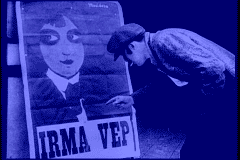 Simply
put, Les Vampires, an action adventure
that follows the exploits of ďThe VampiresĒ, a clandestine group of gadget
using, elaborately plotting, Parisian thieves (who arenít literal
bloodsuckers, but do feed off the rich), and the reporter thatís attempting to
capture them, blows almost any modern action film out of the water, in terms of
the sheer delight that it inspired in me. The thing that shocked me the most
about watching the film was the complete lack of quaintness that I associated
with the film. It pulls no punches (the first chapter is called ďThe Severed
HeadĒ) and entertains completely on the intended level. Though Iíve loved
plenty of silent movies that Iíve seen before, I canít quite say that I
expected that something that was so unabashedly an action film made
for mass consumption by 1915ís audiences would be so damned accessible to my
modern sensibilities. The way Feuillade stages his stunts make them easily as
thrilling as anything Harrison Ford does on screen. His editing style doesnít lean
toward montage, instead favoring a usually still camera and employing deep focus
to create a real sense of the environment that the movie takes place in, as opposed to
allowing the impression that
the action is setbound. He doesnít alter
his style when the film shows us
the stunts, so when one of the Vampires climbs out of a window, we actually get
to watch the entire precarious-looking feat unfold. Thereís a real sense of
danger here, and the way that the film continually dispatches lead characters
makes you always fear the worst. It is genuinely immensely gripping. It's edge-of-your-seat stuff.
Simply
put, Les Vampires, an action adventure
that follows the exploits of ďThe VampiresĒ, a clandestine group of gadget
using, elaborately plotting, Parisian thieves (who arenít literal
bloodsuckers, but do feed off the rich), and the reporter thatís attempting to
capture them, blows almost any modern action film out of the water, in terms of
the sheer delight that it inspired in me. The thing that shocked me the most
about watching the film was the complete lack of quaintness that I associated
with the film. It pulls no punches (the first chapter is called ďThe Severed
HeadĒ) and entertains completely on the intended level. Though Iíve loved
plenty of silent movies that Iíve seen before, I canít quite say that I
expected that something that was so unabashedly an action film made
for mass consumption by 1915ís audiences would be so damned accessible to my
modern sensibilities. The way Feuillade stages his stunts make them easily as
thrilling as anything Harrison Ford does on screen. His editing style doesnít lean
toward montage, instead favoring a usually still camera and employing deep focus
to create a real sense of the environment that the movie takes place in, as opposed to
allowing the impression that
the action is setbound. He doesnít alter
his style when the film shows us
the stunts, so when one of the Vampires climbs out of a window, we actually get
to watch the entire precarious-looking feat unfold. Thereís a real sense of
danger here, and the way that the film continually dispatches lead characters
makes you always fear the worst. It is genuinely immensely gripping. It's edge-of-your-seat stuff.
Thereís
definitely some subtext to be observed here, such as the way that the film,
escapist fare that it is, does not acknowledge that the First World War is going
on. Still, the fear that the Vampires make you feel
canít be completely disassociated from that of the war. The DVD version of the
series includes For the Children, a short
directed by Feuillade that features the cast made to benefit war orphans, so
itís quite obvious that the filmmakers were acutely aware of the foreboding
state of affairs and their responsibility to address it. Also noteworthy is the filmís perception of Parisí tabloid
culture. A surprising number of the plot events come about after one of
the characters reads about something (such as the arrival of a rich American) in
the newspaper. Among the paperís readership, Philippe and Mazamette
(wonderfully played by Marcel Levesque: his ex-Vampire turned nearly straight is
the filmís highlight), the heroes of the tale, are minor celebrities. The
paper covers their exploits, and there are a few instances where a fawning
admirer gives extra leeway to one of them due to their status. That Mazamette
isnít quite the hero that the press makes him out to be is one of the filmís
more satiric points. The Parisian culture we glimpse is one where a reputation
is key, and upon meeting another, a name card is always presented, almost as a
badge. The perception of a person becomes almost as important as what they
actually are. Irma Vep, the most dominant member of ďThe VampiresĒ, uses a
variety of disguises to infiltrate the homes of her victims. Because sheís a
woman, she is perceived as less of a threat, and she notably outlasts many of
her compatriots since her gender keeps her from assuming the role of Grand
Vampire, and largely keeps her immediately out of harmís way.

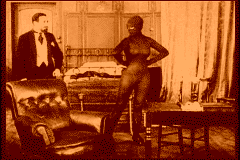
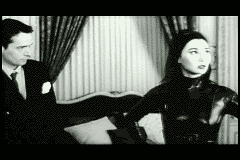

The
reason that I bring up such subtext in a film thatís so wonderfully textual is
because Irma Vep, a masterful 1997
French comedy from director Oliver Assayas that prompted me to seek out the
serial in the first place (and probably prompted the American video release of
Les Vampires), is so laden with it.
Certainly, the dominant theme is that the crew that makes a film is a bit of a
vampire, feeding off the creative juices of the director. Irma Vep, which
chronicles a washed-up filmmaker as he mounts a misguided but ambitious,
still-silent remake of Feuilladeís serial, shows that when the director has
little inspirational lifeblood to offer, the entire group will starve
creatively. The
filmís main character is Maggie Cheung, who plays herself quite well, and much
of the filmís drama comes from her attempts to get in touch with Irma Vep, her
role in the remake. The process that an actor goes through is roughly
analogous to the experience that the character Irma Vep goes through during the
serial. Irmaís changes as she accommodates herself to each of the several
Grand Vampires, successively becoming inspiration and lover to each of them, can
clearly be aligned with the strange bedfellows that result as different actors
are paired with different directors for each project.
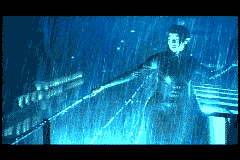 Thereís
much more to Irma Vep than Maggieís admittedly fascinating fall into her
character, however. A lot of the film seems to function as a cinematic state of
affairs, examining the functions and motivations behind the movies we see.
Several times during the film, we are given glimpses at varying modes of
production. There are explicit discussions about Hollywood fare, the Hong Kong
cinema, and auteur-driven French movie making. I wouldnít say the film
necessarily advocates one mode over another, though it snarkily shows the
director taking a swig of Coke after giving some inane stage directions to
Maggie, suggesting his lack of ideas is profoundly American. Irma
Vepís own style is quite immediate, and its hand-held camerawork takes us
along on Maggieís wild ride into a foreign world of filmmaking. It manages to
mildly rebuff the Honk Kong cinema when its biggest proponent seems only
interested in advancing it to further rally against the state of French film,
and Maggie notes that she doesnít get to see much in the way of imported
films, suggesting their market is rather closed-minded. The fictional action
film that Maggie had made before this remake of Les
Vampires sounds like a rather boring genre retread as well.
Thereís
much more to Irma Vep than Maggieís admittedly fascinating fall into her
character, however. A lot of the film seems to function as a cinematic state of
affairs, examining the functions and motivations behind the movies we see.
Several times during the film, we are given glimpses at varying modes of
production. There are explicit discussions about Hollywood fare, the Hong Kong
cinema, and auteur-driven French movie making. I wouldnít say the film
necessarily advocates one mode over another, though it snarkily shows the
director taking a swig of Coke after giving some inane stage directions to
Maggie, suggesting his lack of ideas is profoundly American. Irma
Vepís own style is quite immediate, and its hand-held camerawork takes us
along on Maggieís wild ride into a foreign world of filmmaking. It manages to
mildly rebuff the Honk Kong cinema when its biggest proponent seems only
interested in advancing it to further rally against the state of French film,
and Maggie notes that she doesnít get to see much in the way of imported
films, suggesting their market is rather closed-minded. The fictional action
film that Maggie had made before this remake of Les
Vampires sounds like a rather boring genre retread as well.
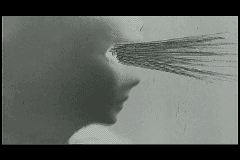 The
French auteur film comes under heavy fire as well. Rene Vidal, the once-successful
director of the Les Vampires remake, is quite obviously doing the film because he
has hit a bit of a creative dead end. He bandies about spouting pretentious
hyperbole about Feuilladeís masterpiece, and itís only when confronted with
his dailies that he really realizes his ideas arenít coming together as he had
planned. He does have a degree of passion for this project, but that passion
seems to be found mostly in his sexual attraction to Maggie. Rene is fascinating
because he shows that when the auteur director finally gives in and makes a film
that is one hundred percent a cinematic expression of his own obsessions and
thoughts (which should be the auteur theoryís ideal) his film is incoherent to
anyone but himself. The other French director that the film shows is not any
more of an ideal. Staunchly convinced his compatriot is wrong in his
convictions, his tastes veer even more toward the mainstream. He quickly
squelches the one personal touch that Rene brought to the project. He works not
to express a piquant creative desire, but instead to get off the governmentís
dole. The ultimate suggestion of Irma Vep
is that if directors and audiences remain at odds with each other about what
they want to be and see, then creation really cannot commence, and in its stead
there will only be reactionary regurgitation. Thereís something truly profound
and beautiful about Reneís original concept, and his definite conviction is
what convinces Ms. Cheung to sign on to the project in the first place. The
movie with thatís lurking within Irma
Vep could be fascinating, but because of the misguided nature of its
creation, the audience will never know. Itís only Feuilladeís film that
seems to get any true reverence here, since, despite (because of?) its populist
goals, it was the product of veraciousness.
The
French auteur film comes under heavy fire as well. Rene Vidal, the once-successful
director of the Les Vampires remake, is quite obviously doing the film because he
has hit a bit of a creative dead end. He bandies about spouting pretentious
hyperbole about Feuilladeís masterpiece, and itís only when confronted with
his dailies that he really realizes his ideas arenít coming together as he had
planned. He does have a degree of passion for this project, but that passion
seems to be found mostly in his sexual attraction to Maggie. Rene is fascinating
because he shows that when the auteur director finally gives in and makes a film
that is one hundred percent a cinematic expression of his own obsessions and
thoughts (which should be the auteur theoryís ideal) his film is incoherent to
anyone but himself. The other French director that the film shows is not any
more of an ideal. Staunchly convinced his compatriot is wrong in his
convictions, his tastes veer even more toward the mainstream. He quickly
squelches the one personal touch that Rene brought to the project. He works not
to express a piquant creative desire, but instead to get off the governmentís
dole. The ultimate suggestion of Irma Vep
is that if directors and audiences remain at odds with each other about what
they want to be and see, then creation really cannot commence, and in its stead
there will only be reactionary regurgitation. Thereís something truly profound
and beautiful about Reneís original concept, and his definite conviction is
what convinces Ms. Cheung to sign on to the project in the first place. The
movie with thatís lurking within Irma
Vep could be fascinating, but because of the misguided nature of its
creation, the audience will never know. Itís only Feuilladeís film that
seems to get any true reverence here, since, despite (because of?) its populist
goals, it was the product of veraciousness.
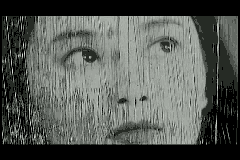 Itís
inspiring that these two movies, made at polar ends of the cinemaís history
with completely different aesthetic and ideological goals in mind, can both
inspire provocative audience response in the same person. Despite their vast
divergences from each other, both films are easily classifiable as bona fide
masterpieces. Sadly, both are rather obscure as well, only reaching the most
hardcore of film fans. The incredible existence of these two films shows that
thereís an unbounded universality in cinema that makes the medium function as
so many wonderful things to so many people. Those are something to be celebrated
not decried. That filmic assets such as these can go relatively unrewarded by
history and commercial success demonstrates both how rich and how blind our
cinematic landscape truly is.
Itís
inspiring that these two movies, made at polar ends of the cinemaís history
with completely different aesthetic and ideological goals in mind, can both
inspire provocative audience response in the same person. Despite their vast
divergences from each other, both films are easily classifiable as bona fide
masterpieces. Sadly, both are rather obscure as well, only reaching the most
hardcore of film fans. The incredible existence of these two films shows that
thereís an unbounded universality in cinema that makes the medium function as
so many wonderful things to so many people. Those are something to be celebrated
not decried. That filmic assets such as these can go relatively unrewarded by
history and commercial success demonstrates both how rich and how blind our
cinematic landscape truly is.
Les Vampires - * * * * Masterpiece
Irma Vep Ė *
* * * Masterpiece
01-14-02
Jeremy Heilman